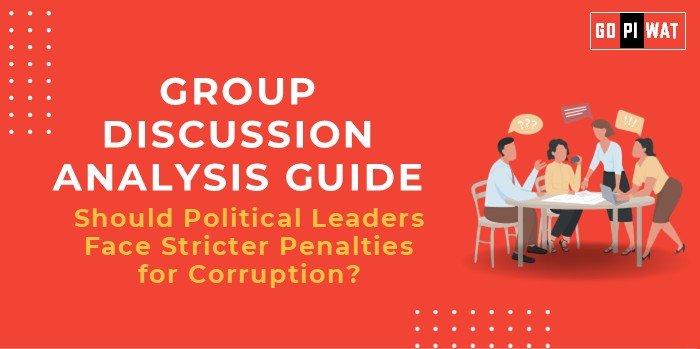📋 Group Discussion (GD) Analysis Guide
🌐 Should Political Leaders Face Stricter Penalties for Corruption?
Corruption undermines public trust, economic development, and democratic values. Political leaders, entrusted with public resources and decision-making powers, are at the center of this critical debate. Stricter penalties for corruption are increasingly demanded due to high-profile scandals and growing calls for accountability worldwide.
📊 Quick Facts and Key Statistics
- Global Corruption Ranking (2023): India ranked 85th out of 180 countries in the Transparency International Index.
- Economic Impact: Corruption costs developing countries $1.26 trillion annually (UN).
- Conviction Rate: In India, only 6% of corruption cases involving politicians result in conviction.
- Citizen Trust: Over 75% of Indians feel corruption has increased in the past year (LocalCircles survey, 2023).
👥 Stakeholders and Their Roles
- Government Agencies: Investigative and judicial bodies enforce anti-corruption laws.
- Citizens: Demand transparency and vote for clean governance.
- NGOs and Media: Highlight issues and ensure accountability.
- International Organizations: Provide benchmarks and encourage anti-corruption frameworks.
📈 Achievements and Challenges
- Achievements:
- Legislative Progress: Introduction of the Lokpal Act in India and Brazil’s Clean Company Act.
- Digital Governance: Reduced corruption risks in India through Aadhaar and Direct Benefit Transfers.
- Challenges:
- Enforcement Gaps: Low conviction rates due to judicial delays.
- Political Will: Politicians often resist stricter regulations.
- International Comparisons: Nordic countries demonstrate better political accountability with high transparency scores.
💡 Structured Arguments for Discussion
- Supporting Stance: Stricter penalties deter corrupt practices, ensuring accountability and fostering trust.
- Opposing Stance: Overly stringent penalties could discourage capable leaders from entering politics.
- Balanced Perspective: Stricter penalties are needed, but systemic reforms and fair trials are equally important.
🔍 Effective Discussion Approaches
- Opening Approaches:
- “According to Transparency International, political corruption remains a global issue, costing economies billions annually. Should stricter penalties be the solution?”
- “A recent scandal highlighted gaps in political accountability. Stricter penalties could prevent such incidents.”
- Counter-Argument Handling: Acknowledge limitations like enforcement hurdles but propose reforms like fast-track courts.
📂 Strategic Analysis of Strengths and Weaknesses
- Strengths: Public demand for accountability, technological tools like blockchain.
- Weaknesses: Judicial backlog, political lobbying.
- Opportunities: Leverage technology for transparency.
- Threats: Abuse of anti-corruption laws for political vendettas.
📚 Connecting with B-School Applications
- Real-World Applications: Research projects on governance reforms and public administration strategies.
- Sample Interview Questions:
- How can stricter anti-corruption laws impact policymaking?
- Discuss global practices in political accountability.
- Insights for Students: Develop frameworks for ethical governance and explore policy-making dynamics.


